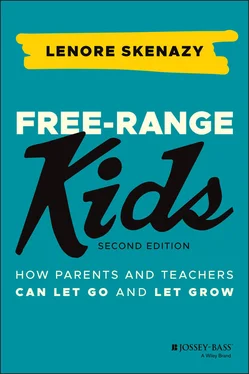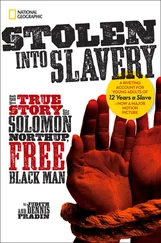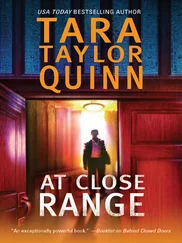1 ...6 7 8 10 11 12 ...15 So now, when you're thinking about whether you could ever let your kids hang out by themselves in the video game department at Target—which is where we'd deposit ours, because otherwise they'd moan and groan the whole time we were trying to concentrate on various Mr. Coffee features—you automatically think about Adam Walsh snatched from the Sears. Even though that was in 1981. Even though, every day, millions of parents go shopping with their whiny kids, and the kids wander off for a while, and the parents panic and then they find them in the toy department and everyone's OK. It's hard to remember, but we should: the likelihood of something truly tragic happening is, thank God, extremely low.
Now let's look at how the folks in the TV biz work to make us feel otherwise.
“As a former TV news producer,” a dad confessed in an email to Free-Range Kids, “I can tell you that news is all about fear. Sometimes, the first criteria we used when judging a story involving children or families was, ‘Is it scary enough?’”
When the answer was “no,” that didn't necessarily kill the story. It just changed the way it was reported—and teased.
“A tease has to hit people in their heartstrings, where you know your words are going to have some impact: their personal safety, or the safety of their family,” said another former TV news producer, Thomas Dodson. “It has to grab the viewers’ attention, and you have a very short time to do it.”
So instead of saying, “If your child is under age three and you happen to have shopped at that little toy store on Elm Street where the proprietor bought some funky wooden blocks from Finland, please note that these could pose a choking hazard if your kid put several of them in his mouth at once, which he probably wouldn't, since they taste bad,” you would say (according to Dodson): “A massive recall of toys! Is something in your child's toy box on the list?”
(To which, by the way, a friend once remarked: “If something that terrible is out there, threatening my children, why the hell are they making me wait till eleven to find out?”)
TV stations love those toy recalls because that way their newscast gets to scare people (good for ratings) while also doing a public service (good for the soul). It's like exposing OSHA violations at a strip club.
Now maybe there is some point to telling us the most anguishing stories of our day, every day. But I was a reporter for twenty years, and I'm still not quite sure what that point is. Is it to warn us about a dangerous neighborhood? That's helpful, I guess. Or to remind people to look both ways when crossing the street or to drive safely? Can't overemphasize those. Is there an exploding pacifier out there that we shouldn't buy? Tell all! But, as former Tucson anchorwoman Tina Naughton Powers says, “On local news, it's ‘Good evening and welcome to death, doom, and destruction. Here's what didn't happen to you today, but it could so we'll keep you in fear!’”
So when Anderson Cooper hosts an hour-long special on missing children, as he has done, he never says, “First off, remember: this will probably never, ever, ever happen to you. In fact, it's almost exploitative that I'm even here talking about it.” No, he turns to the camera with those devastatingly earnest eyes and says, “It is every parent's nightmare.”
Then he interviews the parents who lived that nightmare—their boy rode off on his bike, never to be seen again. Then he talks to a “safety expert” who talks about kids getting snatched from their bikes and calls it “a common scenario.”
Common? It is so not common that it almost never happens. About seventy times more kids die by drowning—is that common? Four hundred times more are killed by car accidents. Four hundred for every kidnapped kid. But would you call a fatal car accident common? Tragic, yes. Common, no.
“Not a word about probability has been spoken,” notes The Science of Fear author Gardner. “Having just seen a string of horrifying examples, [one might] conclude that the chances of this crime happening are high.”
In fact, the fear of some crimes is so over the top that the newest wrinkle—actually, not so new anymore—is parents going online claiming to have just narrowly escaped having their kids snatched away.
You've probably seen a Facebook post like this one: “A man came up to us at Sam's Club and asked if the empty cart nearby was ours… . It seemed like an innocent encounter.” Innocent, that is, until the mom and kids head to Walmart and see the guy again . Can you imagine? How terrifying. He was “feverishly texting on his phone but not taking his eye off my daughter.” This, wrote the mom, could only mean one thing: “I have absolutely NO doubt that that man is a trafficker looking for young girls to steal and sell.”
And I have absolutely no doubt that she's wrong.
Why? Well, first of all, these breathless Facebook posts are so similar, they seem to have been stolen (like an innocent child!) from some Breathless Mom Template: First, mention seeing some guy or guys looking at you and your kids at Store A (or Aisle A). Then, mention the guy or guys turn up again in Store B (or Aisle B). Don't forget to mention your incredible “Spidey Sense” that these ostensible “shoppers” were up to no good. To prove it, throw in a completely normal detail as proof-positive of their nefariousness. (“He only had a few items in his cart,” “He kept glancing at his phone,” “His friend was waiting outside with the minivan's door wide open.”) Then, use the following stat, no matter where you live: “And ______ is the #2 city/state in America for sex trafficking!” (Never say it's #1. That's not believable.) Finally, congratulate yourself for, against all odds, saving your kids by either (A) bravely staring down the guy or guys, or (B) asking the store manager to walk you to your car.
These stories sometimes get hundreds of shares and comments like, “Whew! That was close!” and “Glad your mama bear instincts kicked in!” So maybe it actually seems like a good deed to forward them to your own circle of friends, as a reminder to be on the alert.
But this is not spreading helpful information. It's just spreading baseless fear. I asked crime researcher David Finkelhor, this book's best friend when it comes to debunking urban myths about crimes against kids: How many children have been stolen from their parents in public and forced into the sex trade?
He said he has heard of exactly zero. And remember: His entire job is to track crimes against children.
Why, then, do so many moms write these stories? I don't know if they truly believe that they saved their kids from traffickers, or if they just want the adulation that comes from thwarting a close call.
And in fact, it doesn't matter. What matters is to recognize that when someone is writing about a crime that, in the end, did not take place, we can't talk about it as if a crime did take place. It's like me saying, “I saved myself from the chandelier falling on my head by diving under the couch! … And also, I guess, by the fact that the chandelier didn't fall.” Did I save myself? Do I deserve comments like, “Good move!” and “Close call!”
Anyway, for some reason stories of children in peril—real or fictional, on almost any medium—are great for getting attention. And so, day after day, second after second, a vision of the world comes into our lives that is sad, scary, shocking, and totally at odds with the odds. Switch it off, press delete, or find some other way to ignore the drumbeat of doom and you'll probably be a little more at peace. A little less worried about your kids’ safety.
That may sound like I'm saying, “Ignore the awful truth and go live in your little bubble.” But I'm trying to say that that the horror-filled media is a bubble of its own—a soul-freezing, hope-crushing, shoppers-as-psychopaths place. If you lived there, you'd be dead now.
Читать дальше












